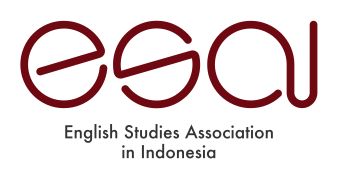An Indonesian EFL Learner’s Dissertation Writing: Some Problems and Solutions
Abstract
A dissertation is said to be an academician’s peak of academic achievement. One can demonstrate his expertise, passion in a particular field of study, and skills through his dissertation. Yet, in general, writing a dissertation may not be simple for every graduate student, especially when he has to write a dissertation about language in a language that is not his native language, English for instance, indicating that he must be able to show remarkable capabilities in manipulating the language. To find out about how a non-English speaking student coped with any problems persisted during the process of writing his dissertation in English I conducted a brief interview with an Indonesian lecturer, majoring in Linguistics, who wrote his dissertation in English. The interview presented some important fact in relation to successfully producing a qualified dissertation, i.e. mastery of one’s field of study, and the English academic writing skills.
Keywords: Dissertation writing, academic writing, linguistics
Full Text:
PDFReferences
Andrade, M. S. (2006). International students in English-speaking universities: Adjustment factors. Journal of Research in International Education, 5, 131-153. Retrieved from http://lib.atmajaya.ac.id/Uploads/Fulltext/141765/artikel/131.pdf [November 7, 2012]
Bauman, R. (2001). Genre. In A. Duranti, Key terms in language and culture (pp.79-81). Massachusetts: Blackwell.
Bordieu, P. (2000). The production and reproduction of legitimate language (1982). In L. Burke, T. Crowley and A. Girvin, The Routledge Language and Cultural Theory Reader (pp.467-477). London: Routledge.
Briggs, C. L. (2001). Interview. In A. Duranti, Key terms in language and culture (pp.132-135). Massachusetts: Blackwell.
Buckingham, L. (2008). Development of English academic writing competence by Turkish scholars. International Journal of Doctoral Studies 3, 1-18. Retrieved November 7, 2012 from http://ijds.org/Volume3/IJDSv3p001-018Buckingham29.pdf.
Cáccamo, C. A. (2001). Codes. In A. Duranti, Key terms in language and culture (pp.23-26). Massachusetts: Blackwell.
Chang, C. E. and Strauss, P. (2010). ‘Active agents of change?’ Mandarin speaking students in New Zealand and the thesis writing process. Language and Education 24 (5), 415–429. Retrieved November 1, 2012 from http://lib.atmajaya.ac.id/Uploads/Fulltext/173527/artikel/Vol.%2024,%20No.%205,%20p%20415%E2%80%93429.pdf.
De Saussure, F. (2000). The nature of the linguistic sign (1916). In L. Burke, T. Crowley and A. Girvin, The Routledge Language and Cultural Theory Reader (pp.21-32). London: Routledge.
De Saussure, F. (2000). Linguistic value (1916). In L. Burke, T. Crowley and A. Girvin, The Routledge Language and Cultural Theory Reader (pp.105-113). London: Routledge.
Du Bois, J. W. (2001). Grammar. In A. Duranti, Key terms in language and culture (pp.87-90). Massachusetts: Blackwell.
Kramsch, C. (1998). Language and culture. Oxford: Oxford.
Labov, W. (2000). The logic of non-standard English (1969). In L. Burke, T. Crowley and A. Girvin, The Routledge Language and Cultural Theory Reader (pp.456-466). London: Routledge.
Manalo, E. (2006). The usefulness of an intensive preparatory course for EAL thesis writers. Journal of Research in International Education, 5, 215-230. Retrieved November 7, 2012 from http://lib.atmajaya.ac.id/Uploads/Fulltext/141765/artikel/215.pdf
Perry, A. (2001). Writing. In A. Duranti, Key terms in language and culture (pp.272-274). Massachusetts: Blackwell.
Sidnell, J. (2001). Competence. In A. Duranti, Key terms in language and culture (pp.34-36). Massachusetts: Blackwell.
Vygotsky, L.S. (2000). Thought and word (1934). In L. Burke, T. Crowley and A. Girvin, The Routledge Language and Cultural Theory Reader (pp. 122-126). London: Routledge.
DOI: http://dx.doi.org/10.30813/jelc.v3i1.295
Refbacks
- There are currently no refbacks.



2.jpg)



